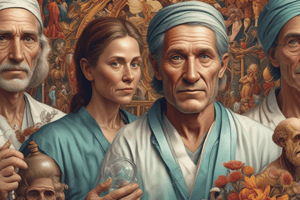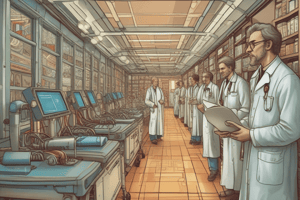Podcast
Questions and Answers
What was the nomadic system of beliefs during the prehistoric stage focused on?
What was the nomadic system of beliefs during the prehistoric stage focused on?
- Unpredictable spirits and their impact on health (correct)
- The role of animals in maintaining health
- The use of medicinal plants for curing diseases
- Predictable spirits and their impact on health
What was the purpose of trepanning skulls during the prehistoric stage?
What was the purpose of trepanning skulls during the prehistoric stage?
- To create decorative patterns on the skulls
- To honor deceased individuals
- To study the anatomy of the skull
- To cure diseases and free victims from demons (correct)
What did Australian Aborigines believe caused illness during the prehistoric stage?
What did Australian Aborigines believe caused illness during the prehistoric stage?
- Lack of proper hygiene and sanitation
- Ingestion of toxic plants and food
- Loss or theft of a person's spirit by an enemy (correct)
- Genetic predisposition to diseases
What was the role of witch-doctors during the prehistoric stage?
What was the role of witch-doctors during the prehistoric stage?
Who is credited with the origin of the microscopic study of tissues?
Who is credited with the origin of the microscopic study of tissues?
Who is known for their contributions to the field of bacteriology and the germ theory?
Who is known for their contributions to the field of bacteriology and the germ theory?
Which scientist is associated with the development of antisepsis using carbolic acid (Phenol)?
Which scientist is associated with the development of antisepsis using carbolic acid (Phenol)?
Who discovered X-rays, revolutionizing the field of surgery?
Who discovered X-rays, revolutionizing the field of surgery?
Which pair of scientists are credited with the development of insulin?
Which pair of scientists are credited with the development of insulin?
Who performed the first open-heart surgery in 1950?
Who performed the first open-heart surgery in 1950?
Who performed the first heart transplant in 1967?
Who performed the first heart transplant in 1967?
Who developed hip replacements in 1972?
Who developed hip replacements in 1972?
Who is credited with the discovery of penicillin?
Who is credited with the discovery of penicillin?
What did Marie François Xavier Bichat contribute to?
What did Marie François Xavier Bichat contribute to?
When was the first kidney transplant performed?
When was the first kidney transplant performed?
What was one of Joseph Lister's significant contributions to medicine?
What was one of Joseph Lister's significant contributions to medicine?
During the Middle Ages, what contributed to the disintegration of western Europe into numerous small fiefdoms?
During the Middle Ages, what contributed to the disintegration of western Europe into numerous small fiefdoms?
What was lacking in Europe during the Middle Ages, which hindered the establishment of universities and public health systems?
What was lacking in Europe during the Middle Ages, which hindered the establishment of universities and public health systems?
Where did many medical ideas from the Greeks and Romans survive during the Middle Ages?
Where did many medical ideas from the Greeks and Romans survive during the Middle Ages?
What dominated medicine during the Middle Ages, emphasizing authority rather than investigation?
What dominated medicine during the Middle Ages, emphasizing authority rather than investigation?
Which period saw the rebirth of learning, the scientific revolution, and advancements in anatomy, surgery, and public health?
Which period saw the rebirth of learning, the scientific revolution, and advancements in anatomy, surgery, and public health?
Who made significant anatomical research in the late 15th and early 16th centuries during the Renaissance?
Who made significant anatomical research in the late 15th and early 16th centuries during the Renaissance?
[During the Renaissance], what recognized the importance of preventing illnesses through hygiene and lifestyle?
[During the Renaissance], what recognized the importance of preventing illnesses through hygiene and lifestyle?
Who is considered the 'Father of Medicine' in ancient Egyptian civilization?
Who is considered the 'Father of Medicine' in ancient Egyptian civilization?
Which civilization is credited with the rejection of magical and superstitious influences in medicine?
Which civilization is credited with the rejection of magical and superstitious influences in medicine?
Which ancient medical text contained observations and cures for injuries without magical thinking?
Which ancient medical text contained observations and cures for injuries without magical thinking?
Who is attributed to the Hippocratic texts that marked the beginning of technical medicine?
Who is attributed to the Hippocratic texts that marked the beginning of technical medicine?
Which ancient civilization contributed significantly to the development of medical knowledge through logic in discussions about health and medicine?
Which ancient civilization contributed significantly to the development of medical knowledge through logic in discussions about health and medicine?
Who were the figures from ancient Egyptian society who performed rituals for divine punishment and healing through magic and medicine?
Who were the figures from ancient Egyptian society who performed rituals for divine punishment and healing through magic and medicine?
Which ancient civilization made crucial discoveries about the human body, such as mummification?
Which ancient civilization made crucial discoveries about the human body, such as mummification?
Who is attributed with crucial discoveries about the human body such as mummification in ancient Egyptian civilization?
Who is attributed with crucial discoveries about the human body such as mummification in ancient Egyptian civilization?
Which ancient Greek philosopher is associated with employing logic in discussions about health and medicine?
Which ancient Greek philosopher is associated with employing logic in discussions about health and medicine?
What marked the beginning of technical medicine in ancient Greece with a focus on natural causes for illness?
What marked the beginning of technical medicine in ancient Greece with a focus on natural causes for illness?
Which stage of medicine in ancient Greece saw the rejection of magical and superstitious influences?
Which stage of medicine in ancient Greece saw the rejection of magical and superstitious influences?
What did ancient Greek doctors focus on to maintain health and prevent disease?
What did ancient Greek doctors focus on to maintain health and prevent disease?
What was the emphasis of Hippocratic Medicine?
What was the emphasis of Hippocratic Medicine?
What was the recommended daily routine for self-care according to Hippocratic Medicine?
What was the recommended daily routine for self-care according to Hippocratic Medicine?
What did the Hippocratic Oath outline?
What did the Hippocratic Oath outline?
What was the impact of Greek medical practices on Rome during the Roman Empire?
What was the impact of Greek medical practices on Rome during the Roman Empire?
Who was the most important physician of the Roman Empire known for his expertise in sports medicine, surgical techniques, and anatomy?
Who was the most important physician of the Roman Empire known for his expertise in sports medicine, surgical techniques, and anatomy?
What were some anatomical errors made by Galen due to his reliance on animal dissections?
What were some anatomical errors made by Galen due to his reliance on animal dissections?
What did Romans develop during the Roman Empire that decreased the occurrence of epidemics?
What did Romans develop during the Roman Empire that decreased the occurrence of epidemics?
How did Romans keep their troops fit and healthy in terms of medical assistance?
How did Romans keep their troops fit and healthy in terms of medical assistance?
Flashcards are hidden until you start studying
Study Notes
- Hippocratic Medicine (c.500BC): Hippocrates emphasized the importance of self-care and hygiene.
- Daily self-care routine: After waking up, face and eyes should be washed with pure water. Teeth should be rubbed with fine peppermint powder. Head should be rubbed and anointed daily, but washed and combed only occasionally.
- Walking regimen: Young and middle-aged men should take a walk of about 10 stadia before sunrise. Walking before meals clears out the body and prepares it for food.
- Hippocratic Medicine (c.500BC): Hippocratic Oath outlines the ethical code for doctors.
- Hippocratic Oath: Doctors should teach their art to their master and children, as well as to all their pupils who will swear the oath. Doctors should not administer poison or harm pregnant women.
- Prehistoric Stage: Pre-technical medicine: Healing was based on magic and religious practices, and each family was served by their "pater familiae."
- Roman Empire (100 BC): Greek medical practices were imposed on Rome, and doctors were mostly Greeks brought as slaves.
- Roman Empire (130-200 AD): Galen, the most important physician of the Roman Empire, was trained at Alexandria. He was an expert in sports medicine, surgical techniques, and anatomy.
- Roman Empire (130-200 AD): Galen made anatomical errors due to his reliance on animal dissections. He believed that blood was created in the liver and that it flowed from one side of the heart to the other.
- Roman Empire (130-200 AD): Romans developed the first-ever system of public health, including aqueducts, public toilets, and a sewer system, which decreased the occurrence of epidemics.
- Military Health: Romans kept troops fit and healthy through medical assistants, medicus medical officers, and a military medical school that required all physicians to attend.
- Military Medicine: Advances in surgery included the use of antiseptic methods, such as acetum, analgesic treatment, and ointments and medicinal plant extracts.
- Middle Ages (IV-XV centuries AD): The Middle Ages marked the period between the end of the Roman Empire (476 AD) and the beginning of the Renaissance (1453 AD). During this time, medical practices were influenced by religious and magical beliefs.
Studying That Suits You
Use AI to generate personalized quizzes and flashcards to suit your learning preferences.




